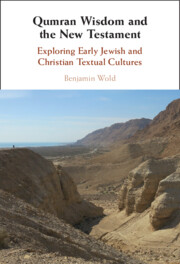Book contents
- Qumran Wisdom and the New Testament
- Qumran Wisdom and the New Testament
- Copyright page
- Dedication
- Contents
- Preface
- Acknowledgments
- Introduction
- 1 Cosmology and Eschatology
- 2 Universalism and Particularism
- 3 Wisdom As Action
- 4 Poverty and Humility
- 5 Debt Remission in the Matthean Lord’s Prayer
- 6 Paul
- Conclusion
- Bibliography
- Index
Conclusion
Published online by Cambridge University Press: 22 December 2022
- Qumran Wisdom and the New Testament
- Qumran Wisdom and the New Testament
- Copyright page
- Dedication
- Contents
- Preface
- Acknowledgments
- Introduction
- 1 Cosmology and Eschatology
- 2 Universalism and Particularism
- 3 Wisdom As Action
- 4 Poverty and Humility
- 5 Debt Remission in the Matthean Lord’s Prayer
- 6 Paul
- Conclusion
- Bibliography
- Index
Summary
Nearly three-quarters of this study is focused on the letter of James because of its sapiential character. Comparisons with the Qumran wisdom tradition in this study are made with James because both (1) are broadly didactic, (2) make use of wisdom terminology, and (3) display similar forms that invite such a comparison. In the mid-1990s Luke Timothy Johnson concluded that “despite all these resemblances to the wisdom tradition … James is scarcely defined by it.” However, to reach such a conclusion first requires that the wisdom tradition during this era is comprehensively appreciated, including the Qumran materials. Within the past circa twenty years early Jewish studies have come to accept that wisdom was in transition during the Second Temple period. That developments in one subdiscipline, namely early Jewish studies, need to be brought to bear on New Testament studies is the point of departure for this book. As the Qumran materials and their relationship to other early Jewish wisdom texts are better understood it becomes possible to revisit whether and how James is defined by this tradition.
- Type
- Chapter
- Information
- Qumran Wisdom and the New TestamentExploring Early Jewish and Christian Textual Cultures, pp. 207 - 214Publisher: Cambridge University PressPrint publication year: 2022

